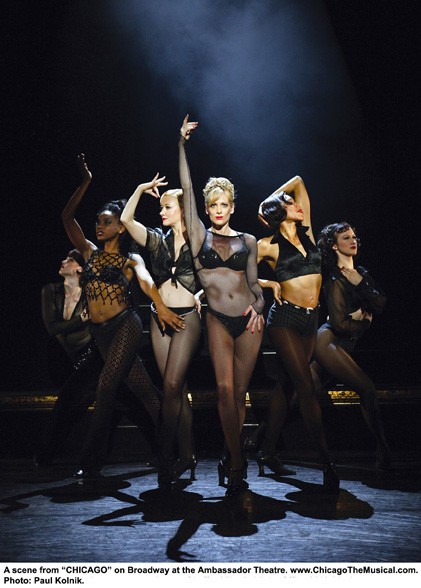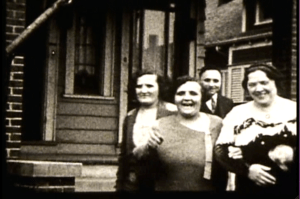The musical Chicago is playing for a short run at the Ordway in St. Paul. If you have a chance, see it.
Many of those Jews probably stayed in Chicago for a time, or at least left some relatives behind there while others moved on, likely serving as a link to the big city (there would not be another one until at least Denver), and perhaps to the past.
Though this conclusion is by no means scientific – I draw it from the fact that it seems inevitable that when we try to identify all the faces in old family photos from the 1920’s – the default answer for anyone we cannot name is “those must be the aunts from Chicago”. The more matronly, frumm, and a bit rotund she may be, the more likely she’s an aunt from Chicago.
But with genealogy these days, it seems that finding out the ‘who, what, and where’ of old photos is only half the battle – and in fact is becoming a bit passé . What seems to be all the rage (for those who can find rage in genealogy) is to get a sense of the lives those folks led at the time.
The musical Chicago does that – and then some.

Written, scored, produced, directed, at least in part – and for all we know starring – a brethren or two, the musical is one of the all time greats on Broadway – and for good reason.
And the traveling production at the Ordway – which opened last night – did not disappoint. For whatever reason, it is only here for a limited stay, through August 12th. If the length of the rush line last night was any indication, tickets might be hard to come by. Try anyway.
As a musical “Chicago” has it all. It brings home the look and feel of the decade, in a stylized and enthusiastic way. According to the playbook, it tells the story of “Murder. Greed. Corruption. Violence. Exploitation. Adultery. Treachery.” Set amidst the razzle-dazzle decadence of the 1920s, Chicago is the story of Roxie Hart, a housewife and nightclub dancer who maliciously murders her on-the-side lover after he threatens to walk out on her. Desperate to avoid conviction, she dupes the public, the media and her rival cellmate, Velma Kelly, by hiring Chicago’s slickest criminal lawyer (Billy Flynn, having a counterpart to this day in most every town we know) to transform her malicious crime into a barrage of sensational headlines, the likes of which might just as easily be ripped from today’s tabloids.”
In several ways, it is indeed a timeless story – the throngs of reporters that hover over Roxie’s every move reminded me of the similar throngs that we would often see on the local news awaiting Amy Senser’s arrival at court – though the fedoras are gone, and the images are digital – the underlying theme then and now is to feed our insatiable appetites for crime and notoriety.
Perhaps more poignantly, and as a more revealing sign of our times, it seemed that a few of the scenes might have touched on a nerve or two that are still too fresh. With recent events in Colorado, and more recently Oak Creek Wisconsin, it is somewhat unnerving to think that the thought of shooting groups of people would evoke thoughts beyond those originally intended, and into the raw headlines of today.
The cast was competent, if not stellar, particularly in terms of their bios. But the show seems to survive and thrive on the inherent quality of its script and score. You are quickly reminded of memorable tunes, including “And All That Jazz”, “Mr. Celophane”, “Razzle Dazzle” and my favorite, the ventriloquist scene between Billy Flynn and Roxie. When done well, and it was done well, there seem to be few scenes better suited for the stage.
If there were one thing that caught my eye last evening, it was the simplicity of the production. The orchestra itself took up center stage, and at times was an integral part of the story. The play made use of next to no scene or costume changes, and minimal props. Instead it relied almost entirely on the script, score, and choreography. At first this could be disconcerting – wondering who this or that woman was now intended to be. Eventually, it sunk in, and became not only acceptable but a given – to the point where by the middle of the second act you’re left thinking “so the judge is wearing black fishnets – you got a problem with that?”
The energy seemed to build throughout the evening with both the cast and audience – and by the end it felt like the thing what just getting into gear, and could have gone on.
So the next time you rummage through that shoebox full of old photos, get out your marker and Celophane tape (or these days Post-it brand note pads – I used to work at 3M) – and think of Roxie and Velma. After seeing the production last evening, my aunts from Chicago may remain nameless, but will never look quite the same.
Hopefully, though, someone is working on a sequel as we speak. I can see it now – “HIBBING, and all that jazz”.


